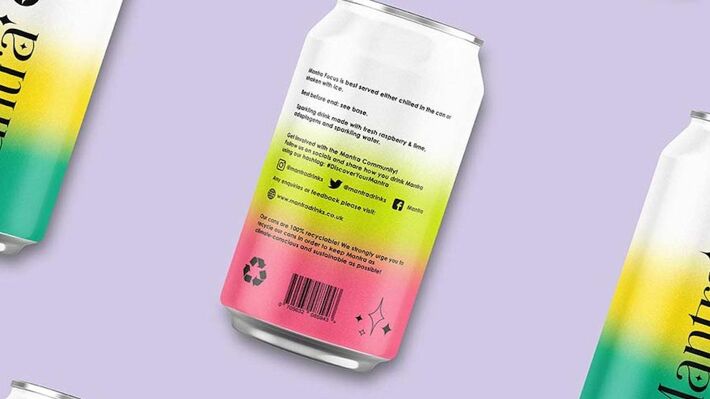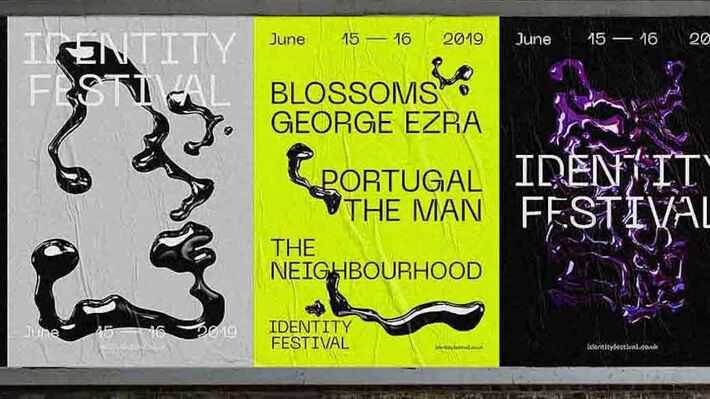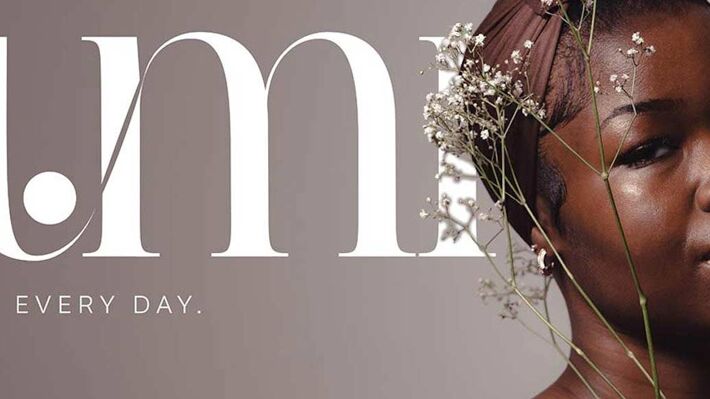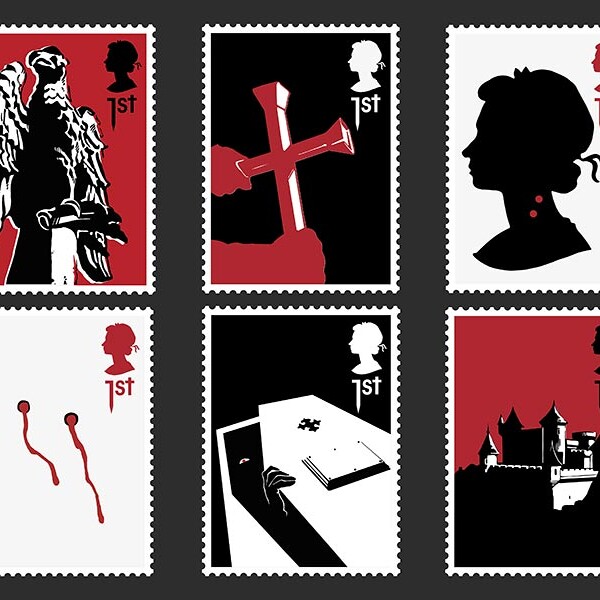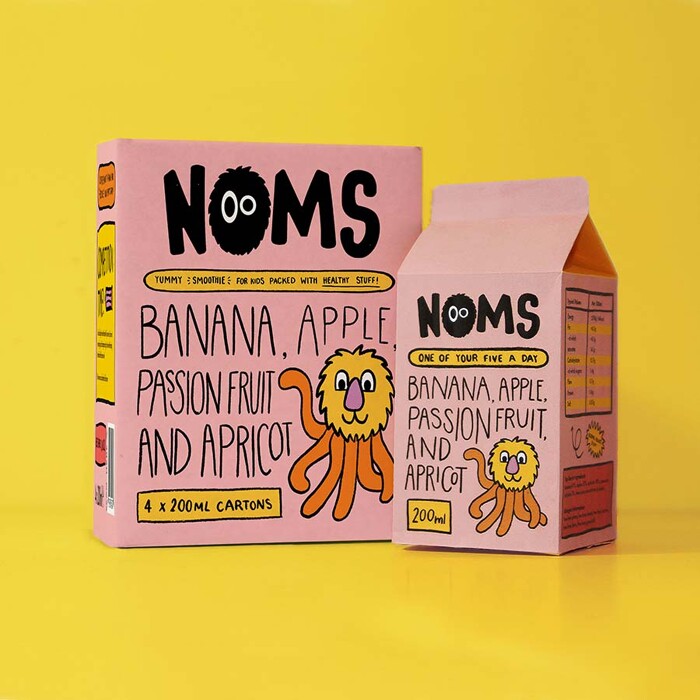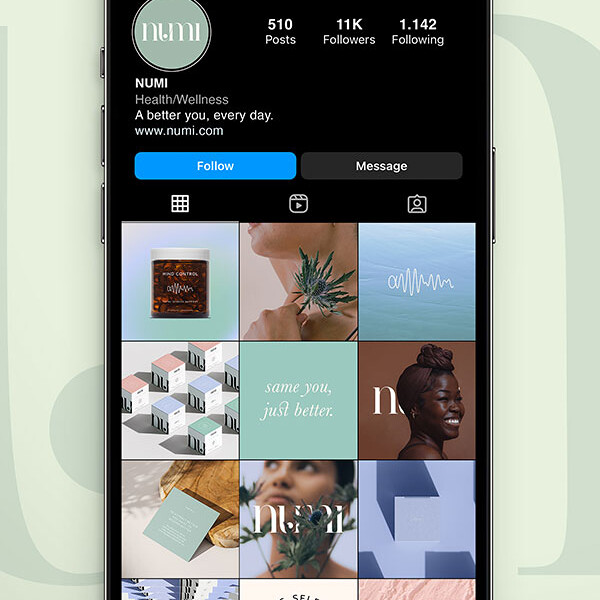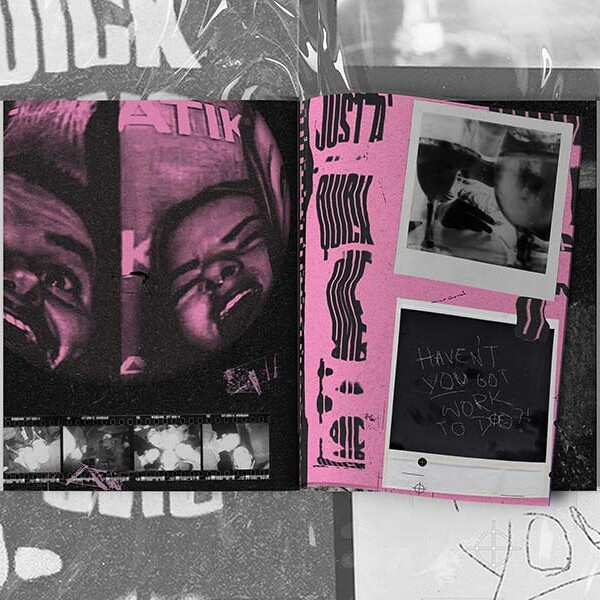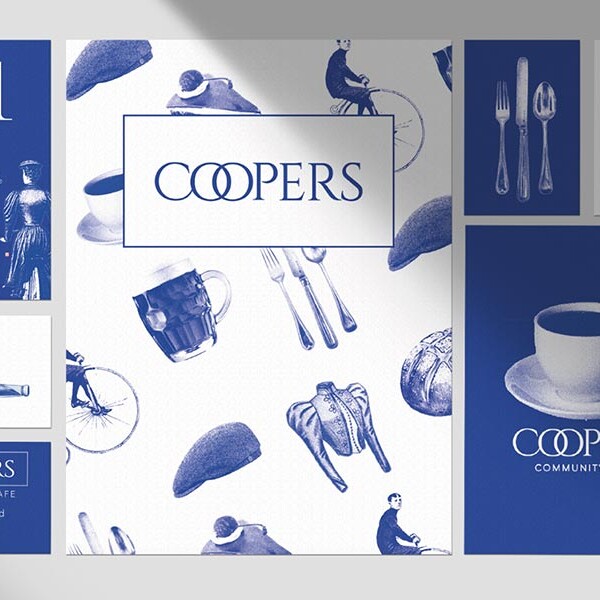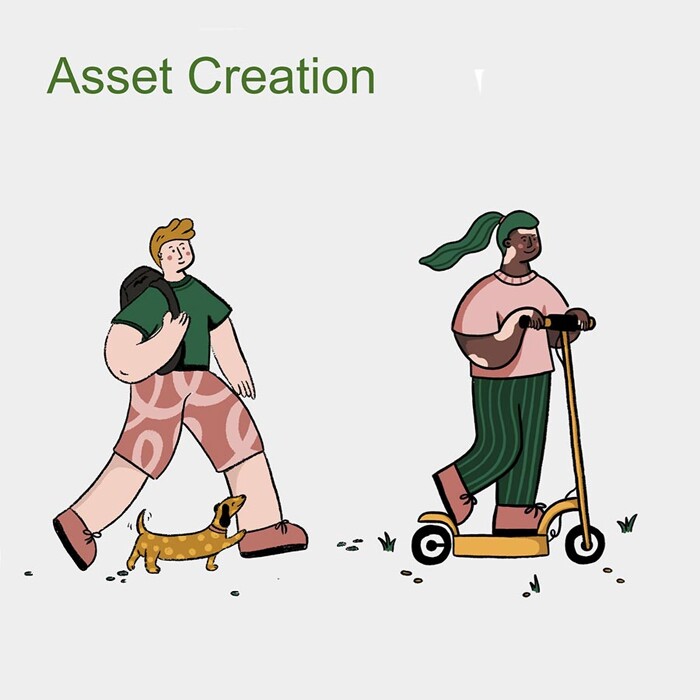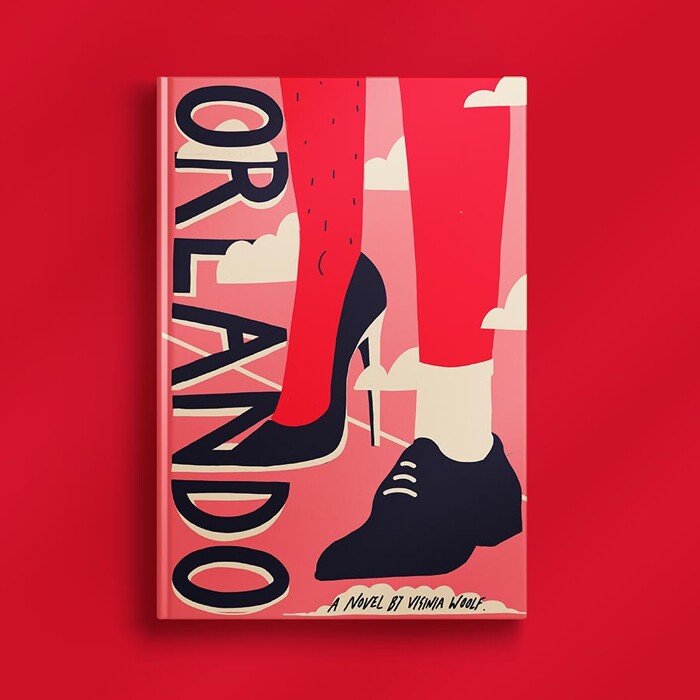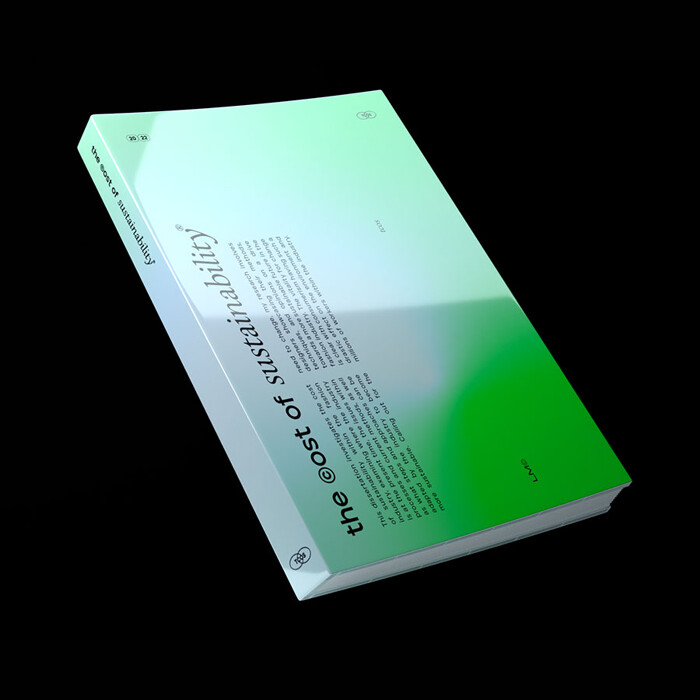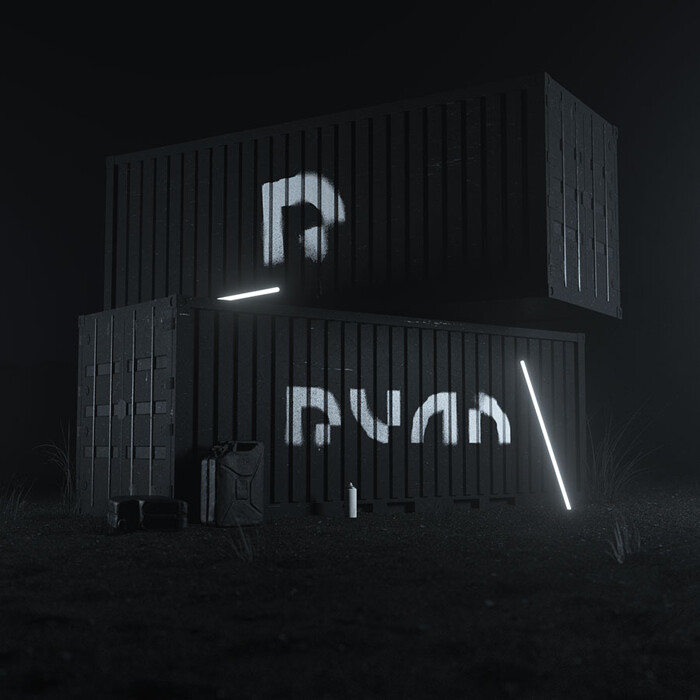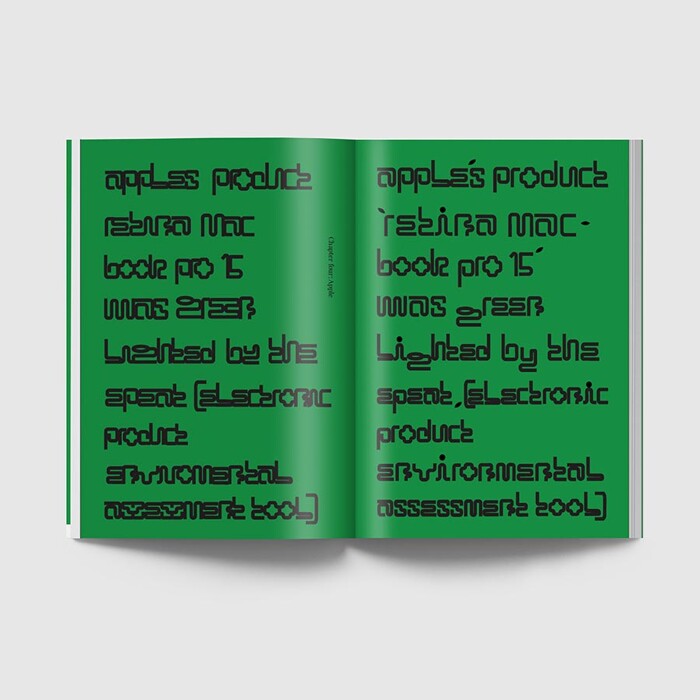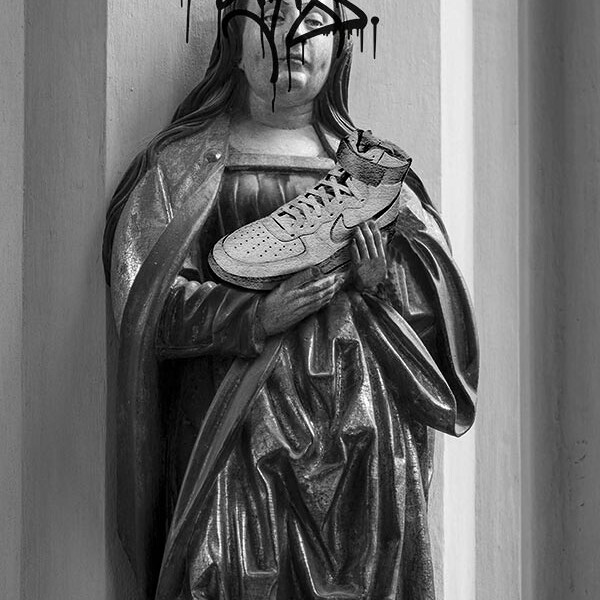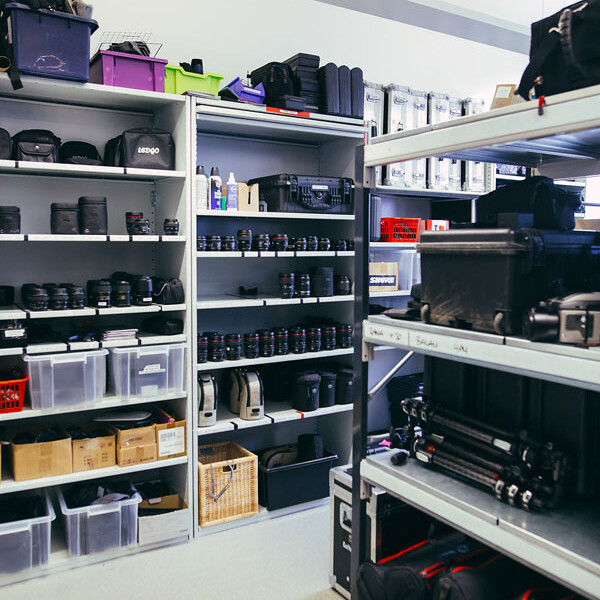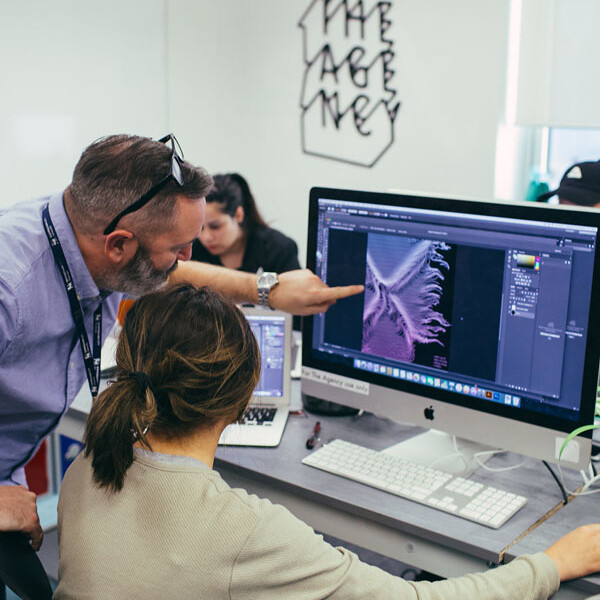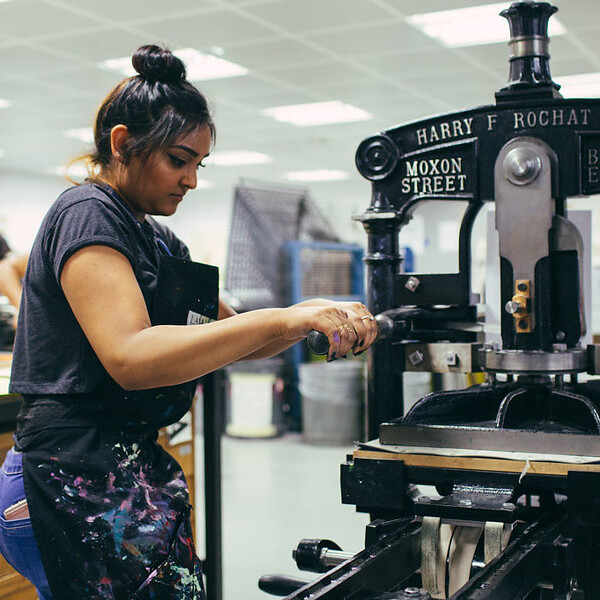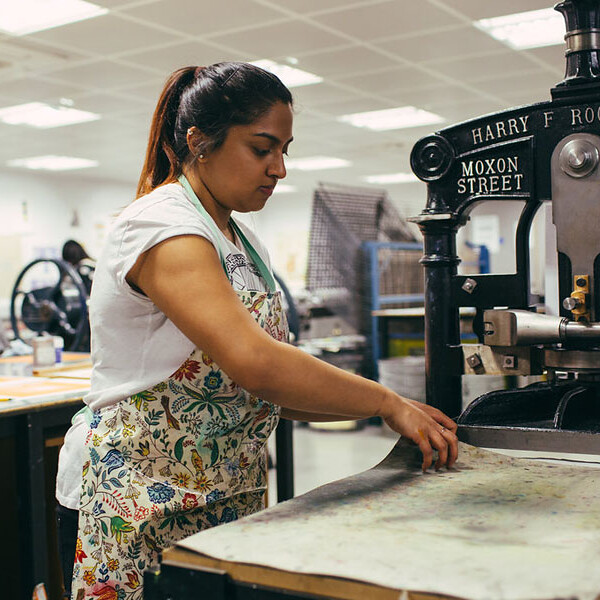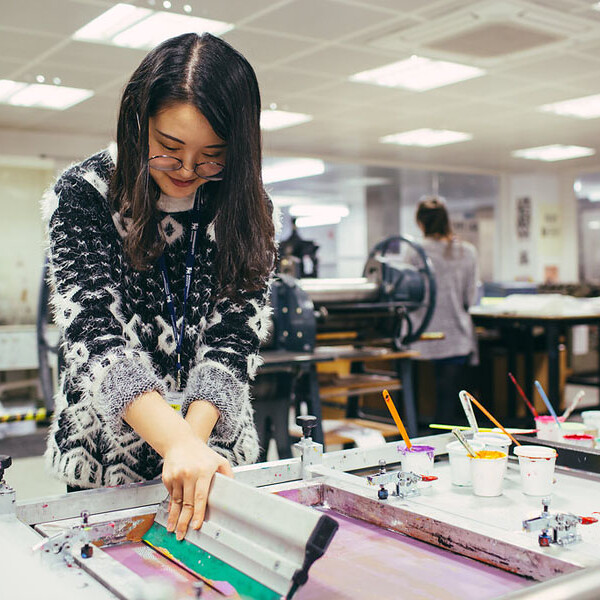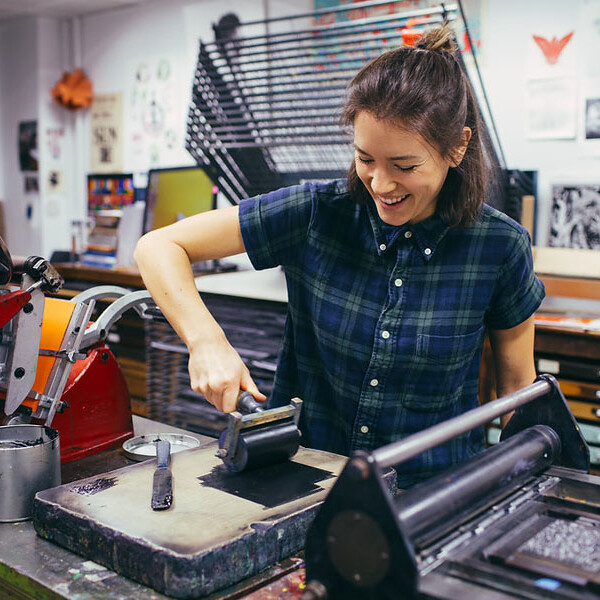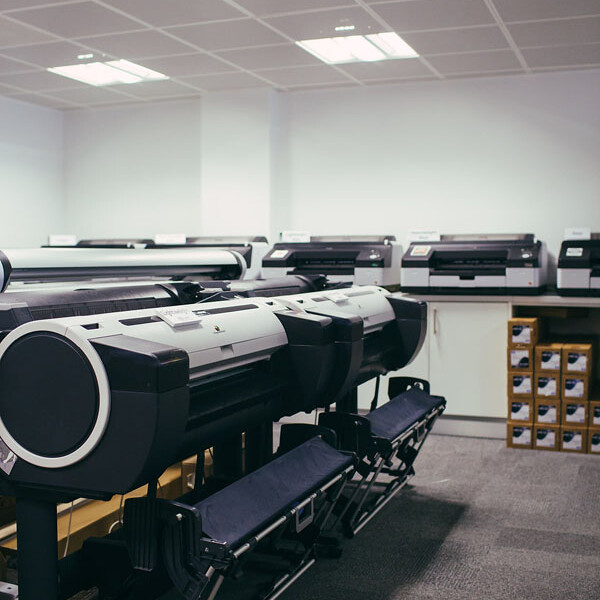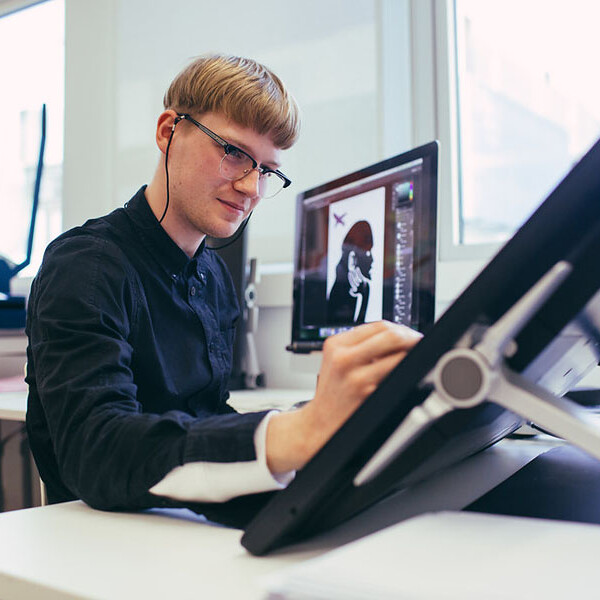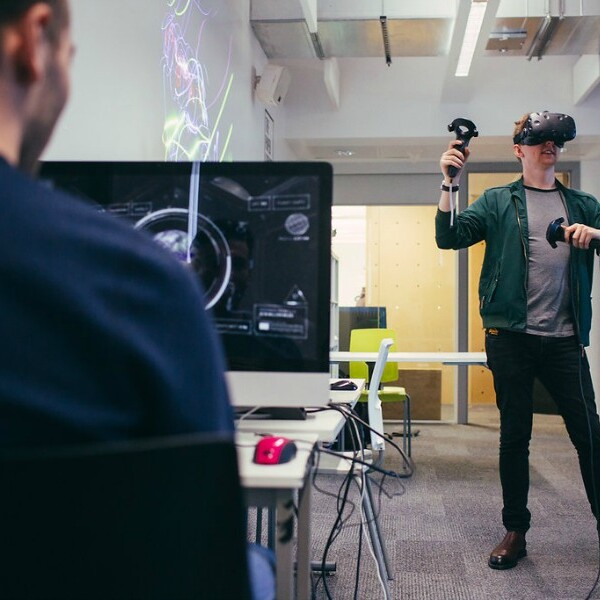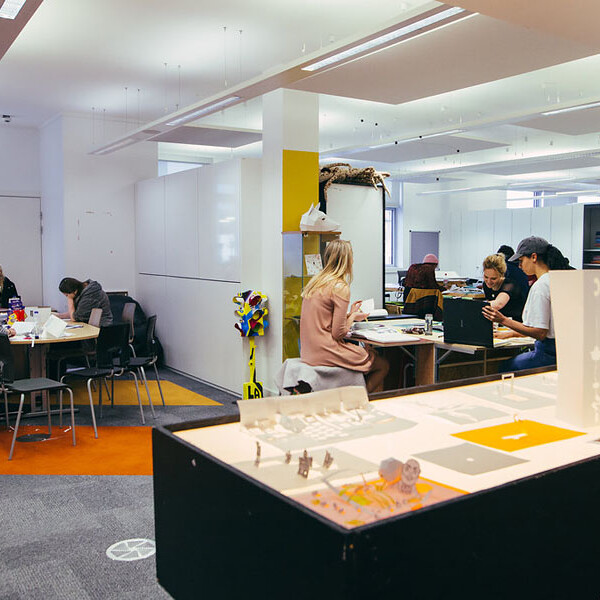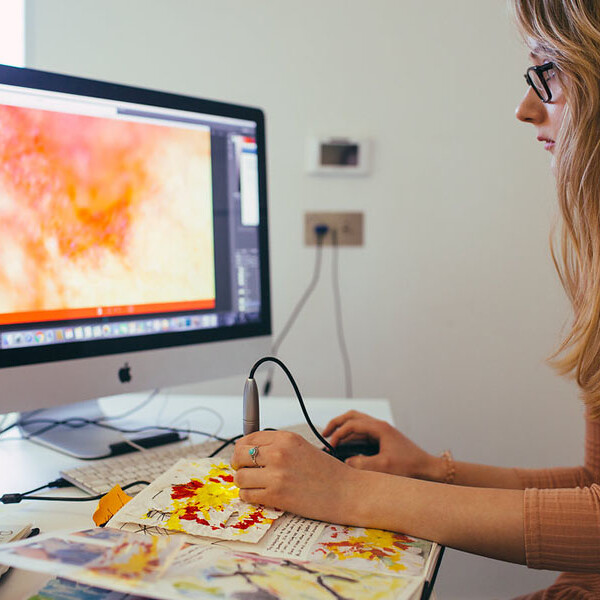Graphic Design - BA (Hons)
Currently viewing course to start in 2025/26 Entry.
BA (Hons) Graphic Design here at BCU is an exciting, engaging, and stimulating course that will equip you with the skills, knowledge, and confidence needed to enter the creative industries. Our team of experienced and knowledgeable staff will support you on your journey, helping you to bring your creative ideas to life....
- Level Undergraduate
- Study mode Full Time
- Award BA (Hons)
- Start date September 2025
- Fees View course fees
- Subject
- Location City Centre
This course is:
Available with Professional Placement year
Open to International Students
Overview
BA (Hons) Graphic Design here at BCU is an exciting, engaging, and stimulating course that will equip you with the skills, knowledge, and confidence needed to enter the creative industries. Our team of experienced and knowledgeable staff will support you on your journey, helping you to bring your creative ideas to life. You’ll develop a variety of design approaches and creative problem-solving techniques, giving you the resilience to succeed in your chosen career path.
As designers, we play an important role in society, and we have the ability to make meaningful change to our world. You will be encouraged to develop a critical eye through briefs that challenge you to go beyond the surface, providing sustainable & culturally conscious solutions to real-world issues
What's covered in this course?
During your time with us, you will develop the practical and intellectual skills required to succeed in a dynamic and ever-changing environment. Our modules are designed to provide you with exciting and engaging learning experiences which will prepare you for a career in graphic design. Our first year of study focuses on creative play and risk-taking, along with building up core skills and an understanding of design principles and areas of practice. In your second year, you will get the chance to work on live briefs and to gain real-world industry experience, along with advancing your creative and technical skills to a higher level. Our final year is all about developing autonomy within your practice, cultivating a deeper approach to critical thinking, and readying yourself to enter the creative industries.
On the course you’ll get the chance to explore a wide range of areas of practice within graphic design, including branding, packaging, motion design, editorial, typography, UX/UI, art direction, and advertising, as well as delving into emerging technologies such as VR/AR and 3D rendering. Rather than specialising in just one of these areas of practice, we encourage our students to adopt a multi-disciplinary approach, making them desirable to employers and giving them the adaptability, they need to flourish in their creative futures. Collaboration is not only facilitated but actively encouraged on our course, and you’ll have the chance to work with students from other disciplines including illustration, photography, digital marketing and more.
One of our main focuses is employability, and all students who study with us will receive targeted support with professional skills and will leave with an industry-ready portfolio.
Professional Placement Year
This course offers an optional professional placement year. This allows you to spend a whole year with an employer, following successful completion of your second year, and is a great way to find out more about your chosen career. Some students even return to the same employers after completing their studies.
If you choose to pursue a placement year, you will need to find a suitable placement to complement your chosen area of study. You will be able to draw on the University’s extensive network of local, regional, and national employers, and the support of our Careers teams. If you are able to secure a placement, you can request to be transferred to the placement version of the course.
Please note that fees are payable during your placement year, equivalent to 20% of the total full-time course fee for that year.
The industry guests, alumni talks, and extra activities have honestly made my university experience. I knew before I started that the course had a big focus on industry with live briefs, but I have absolutely loved the networking and learning opportunities we have been given throughout.
Jessie Milton
Why Choose Us?
- Our focus on employability means that our graduates have excellent prospects after their time with us. All students receive targeted support with professional skills, and will leave with an industry-ready portfolio. Our alumni also receive three years of ongoing careers support after graduating.
- Live project partnerships include Turner Duckworth, Superunion, Conran Design, Design Bridge, Man Vs Machine, Studio BLUP, Bulletproof, The Times, and The Pratt Institute, with many award winners offered placements which have led to permanent employment. Competitions help inform the curriculum; we take part in D&AD’s global student awards scheme, RSA, ISTD, Creative Conscience, and Starpack Awards.
- This course has arranged design agency tours in Birmingham, London, and New York to support your creative output and to provide valuable industry insight, including visits to world-renowned Pentagram and Design Bridge.
- Birmingham is a vibrant and diverse city with a thriving and supportive design scene. It’s also the youngest city in Europe, which means it’s a great place to be a student.
- The design sector is a major and fast-growing contributor to the UK economy. Digital design in particular is seeing significant growth, and our course is well provisioned to meet the increased demand for these skills.
Open Days
Join us for an Open Day where you'll be able to learn about this course in detail, chat to students, explore our campus and tour accommodation. Booking isn't open for this event yet, register your interest and we'll let you know as soon as booking goes live.
Next Open Day: 28 June 2025
Entry Requirements
These entry requirements apply for entry in 2025/26.
All required qualifications/grades must have been achieved and evidenced at the earliest opportunity after accepting an offer to help confirm admission and allow for on-time enrolment. This can also include other requirements, like a fee status form and relevant documents. Applicants can track their application and outstanding information requests through their BCU mySRS account.
Essential requirements
- Standard offer: 112 UCAS Tariff points. Learn more about UCAS Tariff points.
- Accelerate offer: 80 UCAS Tariff points. Find out more about BCU Accelerate.
Applicants will also need to submit a good portfolio.
If you have a qualification that is not listed, please contact us.
Don’t meet our entry requirements?
You could apply for a foundation course or a course at our International College. These routes have lower entry requirements and act as the bridge to a full degree. To find out more, please select your status:
Fees & How to Apply
UK students
Annual and modular tuition fees shown are applicable to the first year of study. The University reserves the right to increase fees for subsequent years of study in line with increases in inflation (capped at 5%) or to reflect changes in Government funding policies or changes agreed by Parliament. View fees for continuing students.
Award: BA (Hons)
Starting: Sep 2025
- Mode
- Duration
- Fees
- Full Time
- 3 years
- £9,535 in 2025/26 ✱ Important note for this price
- Apply via UCAS
(↩Back to price) * The Government is proposing to increase the cap on full-time regulated tuition fees to £9,535 for 2025/26 and the University is planning on increasing fees to that maximum level once legislation is enacted. Part-time fees are charged pro-rata, where applicable.
International students
Annual and modular tuition fees shown are applicable to the first year of study. The University reserves the right to increase fees for subsequent years of study in line with increases in inflation (capped at 5%) or to reflect changes in Government funding policies or changes agreed by Parliament. View fees for continuing students.
Award: BA (Hons)
Starting: Sep 2025
- Mode
- Duration
- Fees
- Full Time
- 3 years
- £17,690 in 2025/26
Guidance for UK students
UK students applying for most undergraduate degree courses in the UK will need to apply through UCAS.
The Universities and Colleges Admissions Service (UCAS) is a UK organisation responsible for managing applications to university and college.
Applying through UCAS
- Register with UCAS
- Login to UCAS and complete your details
- Select your course and write a personal statement
- Get a reference
- Pay your application fee and submit your application
Guidance for International students
There are three ways to apply:
1) Direct to the University
You will need to complete our International Application Form and Equal Opportunities Form, and submit them together with scan copies of your original academic transcripts and certificates.
2) Through a country representative
Our in-country representatives can help you make your application and apply for a visa. They can also offer advice on travel, living in the UK and studying abroad.
3) Through UCAS
If you are applying for an undergraduate degree or a Higher National Diploma (HND), you can apply through the UK’s Universities and Colleges Admissions Service (UCAS).
You can request a printed form from your school or nearest British Council office. You will be charged for applying through UCAS. Birmingham City University’s UCAS code is B25 BCITY.
Portfolio guidance
If you receive an offer to study this course, you will be required to submit a portfolio. We ask that this is submitted within four weeks of receiving your offer.
Please see our portfolio guidance page for tips on putting your portfolio together.
Portfolio guidance
If you receive an offer to study this course, you will be required to submit a portfolio. We ask that this is submitted within four weeks of receiving your offer.
Please see our portfolio guidance page for tips on putting your portfolio together.
Personal statement
UK / EU students are required to submit a personal statement as part of their application for this course.*
The personal statement gives you a crucial opportunity to say why you’re applying and why the institution should accept you.
Here are the key areas you’ll need to address:
- Course choice - Why does this course appeal? What areas are of particular interest?
- Career plans - If you have a specific career in mind, say how your chosen course will help you pursue this goal.
- Work experience - Mention any work that is relevant to your subject, highlighting the skills and experience gained.
- School or college experience - Highlight skills gained at school/college, eg summer schools or mentoring activities.
- Non-accredited skills or achievement - eg Duke of Edinburgh Award, Young Enterprise scheme.
You should also mention your future plans – if you’re planning to take a year out, don't forget to give your reasons. Talk about any subjects you’re studying that don’t have a formal assessment and any sponsorships or placements you’ve applied for. And don't be scared to add in details about your social, sports or leisure interests.
Worried about Personal Statements?
If you've got no idea where to start or just want to check you're on the right track, we’ve got expert advice and real examples from our students to help you nail your personal statement. You can even download our ultimate personal statement guide for free.
*Non-EU students are not required to submit a personal statement when applying for this course.

Financial Support
We offer further information on possible undergraduate financial support. This includes the type of loans, grants and scholarships available both from the government and from Birmingham City University.
Course in Depth
First Year
Your first year of study will introduce you to the basic skills and critical framework within Graphic Design. You will be taught through a series of modules, which provide you with the knowledge to further explore this ever-expanding discipline.
You will develop skills that encompass composition, line, form, narrative, type, imagery, colour, juxtaposition and ideation. From these fundamental principles, you can tailor the remainder of the course to areas of graphic design that are of particular interest to you and your future career aims. Through your modules you will discover the application and use of colour, light, scale, composition, the typographic hierarchy, motion design, UI and interactive design.
Fundamental visual communication issues will be addressed through a series of core lectures and theory seminars. You will also have the opportunity to work with other students by selecting one of five in house options.
In order to complete this course you must successfully complete all the following CORE modules (totalling 100 credits):
Fundamental Practice: Graphic Design introduces students to Graphic Design as an activity, a medium, a practice, a profession, and a subject for study. Through a focus on learning the core principles that are essential for effective visual communication, students will begin to develop the fundamental hands-on and digital skills required in successful graphic design projects. By analysing examples of graphic design, both historical and contemporary, students will gain a deeper understanding of how design functions, bringing this learning into their own work and developing a foundation for further study and future professional work.
Professional Futures: Communication equips you with the initial skills and knowledge necessary for your future career. The module explores the role of effective communication in the context of your emerging design practice. You will engage with theoretical frameworks and practical exercises to develop your contextual understanding of the subject, recognising their relevance in research, development and communication of key themes and ideas.
In Design at Play you will embark on an immersive journey into the fundamentals of brand design and its application across various channels. From crafting compelling visual identities, to designing impactful packaging and engaging digital platforms, students will explore the multifaceted world of branding and its pivotal role in shaping consumer perceptions and fostering lasting connections.
Design for Change is an interdisciplinary module that equips students with the knowledge, skills, and mindset to harness the power of design for positive social and environmental impact. Through a combination of theoretical study, hands-on tasks, and collaborative learning experiences, you will explore regenerative design principles, social impact, environmental sustainability, community engagement, and human-centred design principles.
Core modules are guaranteed to run. Optional modules will vary from year to year and the published list is indicative only.
Second Year
Through a combination of theory and experiment, you will learn how to evaluate and apply principles to practice, and will receive opportunities for placement, field study, collaborative and interdisciplinary work. We shall help you to develop your own personal direction, focusing towards the establishment of a specialised and flexible area of practice.
You will learn how to effectively communicate information, arguments and analysis in a variety of forms to specialist and non-specialist audiences. You will enhance your ability to work collaboratively within a working environment, demonstrating knowledge of the main methods of enquiry within the field.
You will develop your critical awareness, individual style and perspective and. You will formulate approaches to solving problems, helping you to further understand the creative role, opportunities and responsibility of the contemporary designer.
In order to complete this course you must successfully complete all the following CORE modules (totalling 100 credits):
Emerging Technologies immerses you in the cutting-edge world of technology-driven design innovation. With a focus on emerging trends such as augmented reality (AR), virtual reality (VR), 3D modelling, projection mapping, and generative coding, students will explore how these technologies are reshaping the landscape of graphic design and opening up new possibilities for creative expression.
‘Professional Futures: Collaboration’ is designed to equip you with the essential skills for success in the diverse and collaborative field of design. With collaboration and communication as central themes, you will learn to navigate interdisciplinary teamwork and understand different design processes, methods and outcomes.
The module provides an opportunity to tackle real-world challenges through a cross-disciplinary collaborative project. This allows you to have a shared and reflective learning experience contributing to a shared task, preparing you for the demands of your future career. You will learn to convey ideas, concepts and project narratives with clarity and impact.
Assessment involves interdisciplinary teamwork to develop a creative project, emphasising communication, creativity, and project outcomes.
The aim of this final Level 5 module is to develop your critical, reflective, and analytical skills to define your area of practice. The module comprises of three distinct phases that will enable you to explore your interests further and broaden your knowledge of potential career pathways within the wider context of graphic design. These phases work together to comprehensively investigate your practice, prepare you for Level 6 study, and develop an industry standard showreel that showcases your skills and enhances your online presence.
In order to complete this course you must successfully complete at least 20 credits from the following indicative list of OPTIONAL modules:
Central to this experience is a 70-hour work placement, which you can complete either in a concentrated block or spread out over the duration of the module. During this placement, you’ll have the opportunity to develop your professional attributes and subject-specific skills. To align closely with real-world job market conditions, you should expect to prepare a current and relevant CV, attend interviews, conduct research to source your own placement.
Creative careers often lead individuals on unexpected journeys, traversing diverse paths. Recognizing and seizing opportunities becomes pivotal in shaping a fulfilling portfolio career—one that harnesses your creative abilities while sustaining your livelihood. Whether you’re crafting artistic artifacts, performing, providing services, or offering consultancy, the art of promoting and pitching ideas lies at the heart of an independent, entrepreneurial journey.
In this module, we delve into the essential facets of an entrepreneurial career. Whether you see yourself as a designer-maker, actor, musician, illustrator, artist, writer, filmmaker or a blend of any number of roles within a portfolio career, we’ll equip you with the tools to articulate your experiences and work confidently. Expect surprises along the way—opportunities that may reveal themselves unexpectedly!
This module provides an opportunity for you to apply your knowledge and skills to an external, professional brief. The brief will be ‘real’, set in negotiation with an external client/agency/community, or it may be a simulation, inspired by a typical professional scenario you might experience in a work situation. The brief will enable you to apply your discipline-specific skills broadly, collaborating with your fellow students and, where relevant, across disciplines and with other stakeholders. Your project should consider sustainability and address relevant UN Sustainable Development Goals as a key aspect of contemporary creative industries work.
Core modules are guaranteed to run. Optional modules will vary from year to year and the published list is indicative only.
Professional Placement Year (Optional)
In order to qualify for the award of BA (Hons) Graphic Design with Professional Placement Year a student must successfully complete the following module.
Professional Placement Year 120 credits
Final Year
During your final year of study you will be supported in establishing the confidence to acknowledge and assert your own distinctive work identity. You will be required to demonstrate within your work a particular view of what constitutes a design proposition.
You will enhance your communication skills, allowing you to develop confidence and understanding, allowing you to capably articulate your views and knowledge to others.
The final year of the programme is designed to help you demonstrate a systematic, extensive and advanced knowledge of contemporary Graphic Communication. You shall work autonomously or collaboratively to a professional standard on self-generated projects, with creativity and imagination.
In order to complete this course you must successfully complete all the following CORE modules (totalling 120 credits):
Having developed and defined your direction of study throughout Level 5, you will now advance your practice as you enter your final year of study. This module will provide you with the opportunity to adopt an increasingly autonomous commitment to your individual direction. At this stage, a focused attitude is essential in developing an informed and contextualised approach to your thinking, ongoing project development, and outcomes.
The key aim of this module is to build upon the work undertaken in previous modules and contextualise this within a written assignment or its equivalent, that frames both your work and identifies possible future direction. You will look to achieve this through the collection and use of both primary and secondary research. This should be used to support a deeper understanding of your discipline and practices, with further analysis used to help shape your on-going development as a successful creative.
The purpose of the module is to enable you to undertake a sustained, in-depth and theoretically informed research project exploring an area that is of personal interest to you. It is important that we can support you appropriately, so you will be guided towards choosing a research topic which is relevant to your discipline and in which your lecturers have expertise. The outcome may take the form of a written dissertation or a practice-based portfolio.
Professional Futures: Presentation provides final-year students with essential skills and strategies for navigating the design industry. With a focus on ‘presentation’ and employability, the module provides you with guidance on refining your skills, whilst preparing you for the next stage of your design journey.
Download course specification
Download nowClassroom projects and activities
Look book
Students successfully collaborated with photography and fashion staff and students to create a look book. This substantial editorial was professionally designed and printed. The students' involvement included design, art direction, typographic hierarchy, editing, production and setting up the editorial for print.
Student work
Our final-year students engage with briefs which have social benefits as well as experimentation and commercial outcomes.
The following students work are exemplars of these aspects:
- Richard Jones has an affinity for visual identities and brand strategy, ensuring all aspects are rationalised. Richard’s work exemplifies a broad socially aware design ethic and encompasses work with the RNIB and Winterbourne Press
- Nora Bruno’s passion for creativity and design brought her to the UK about six years ago. Nora enjoys working with ink, paper, typography, calligraphy and hand lettering. Her work represents her passion for working in an experimental way and the use of mixed media such as screen-printing, letterpress and mixing printmaking with digital techniques
- Taylor Lantelli enjoys all kinds of art and design, and would consider herself more of a 'maker' because she loves creating tangible objects. In terms of graphic design, her real passion lies in anything print and editorial. She finds publications fascinating and views every page as a separate piece of artwork.
Trips and visits
While you study the course you will be offered opportunities to go on group excursions both in the UK and abroad. There are usually three overseas trips a year to Venice, New York and Berlin.
Locations do alter each year to allow for students to experience a range of cities. We always put on UK study trips to places such as London, Manchester, Oxford and Liverpool. Where possible, UK trips are free or heavily subsidised.
As a Visual Communication student, you’ll be encouraged to take advantage of these trips as we see them as adding extra value to your course and they do offer additional research opportunities.
Whilst in Hong Kong I explored the typography of various regions of the area and was part of the team that delivered workshops such as letterpress to the overseas students. The trip gave me the opportunity to visit a range of galleries and network, enabling me to organise my own show in Hong Kong.
My trip with BCU was one of the most eye opening, educational and enjoyable experiences of my life and I would highly encourage other students to take up any overseas opportunities if they get the chance.
Liam Blunden
Further Study
As graduating students you will follow your own career path, which may mean going straight into industry. However, many students look at the opportunities we offer for postgraduate study at the University.
Birmingham City University runs a one-year MA Visual Communication course as a natural progression from its undergraduate courses. You will be encouraged to continue your journey with us and develop your practice further.
Employability
Placements
You are required to develop strong networks, identifying opportunities and work placements appropriate to your practice. Visits to companies, interviews and live projects are an excellent way to introduce you and to develop these links. More formal placements have included opportunities with Turner Duckworth, Studio Blup, Epoch, One Black Bear, Mother, McCann and Digital Glue, along with various graphic design opportunities including editorial design, branding and art direction.
Summer placements with high-profile companies Z3, TDL and most recently White October have been offered as rewards for live project initiatives. These prestigious opportunities allow students to gain a real insight into the creative approaches used by these organisations.
Links to Industry
Our partnerships with industry include the following: day briefs, live briefs, competitions, pitches, curriculum development and awards ceremonies. Live project partnerships include Turner Duckworth, Superunion, Conran Design, Epoch, Design Bridge, Man Vs Machine, Studio BLUP, Bulletproof, The Times and The Pratt Institute and more. Take a look at how students have worked with industry.
Facilities & Staff
Our creative degrees are housed in the state of the art £62 million Parkside Building, part of our City Centre Campus.
We offer extensive studio and workshop space and cutting-edge equipment such as Vicon 3D (an external tracking motion capture facility) and Gypsy (an exoskeleton-based motion capture system). Both of these systems extend the possibility for production of 3D animation and films.
We offer cutting-edge provision such as digital print centres and Sonny Ross became the first Arts, Design and Media student to master the art of the RISO machine. He has since used this to produce many successful RISO publications including “Rojo & Baxter” which has been a success at various zine and book fairs across the country
We have fantastic letterpress and screen printing facilities and typographic archives as part of our facilities. We offer book-binding and printing techniques as part of the course. Students also have access to 3D printing and wood workshop facilities within the building.
Students from Graphic Design also have the opportunity to use letterpress and printing in the Winterbourne Press with lecturer Rebecca Howson.
Our staff
Jane Anderson
Course Director and Lecturer in Graphic Design
Jane Anderson is Course Leader for BA (Hons) Graphic Design at Birmingham City University. As a passionate educator, active design practitioner, and researcher, Jane contributes to renewal and richness in the creative industry both locally and nationally.
More about JaneJonathan Griffiths
Lecturer in Graphic Design. Video and Motion Graphic – Designer, Director.
A video and motion graphic designer, director, and company owner, Jonathan has over 15 years of creative and digital agency experience. He has worked for national and international creative studios and brands. Within two years his company received direct commission from clients such as PayPal, Town Hall Symphony Hall and London’s Footpatrol store...
More about JonathanDr Colette Jeffrey
Associate Professor of Wayfinding & Inclusive Design
Dr Colette Jeffrey is an Associate Professor of Wayfinding and Inclusive Design at Birmingham City University where she teaches wayfinding and graphic design on the BA(Hons) Graphic Design course, supervises PhDs, and researches real-world wayfinding behaviour. Her PhD investigated why people get lost in buildings and the influence of information...
More about ColetteMartin Donnelly
Lecturer in Graphic Design
Martin is a multi-disciplinary creative and educator with over 20 years of experience in the design industry and seven years in education. In 2000 Martin Graduated from Birmingham City University with a First Class BA (Hons) degree in Graphic Design by Negotiated Studies and became a founding member of midlands based creative agency Clusta...
More about MartinWilliam Parslow
Lecturer
Designer and educator Will Parslow has been an anti-disciplinary practitioner since 2014 making work that is experimental and conceptually driven for both commercial and cultural applications. Will has worked with big clients such as: New Balance, Converse, Jaguar Land Rover, Gucci and The National Trust. But, his best work comes from collaborating...
More about WilliamDr Gyeonghwa Lee
Lecturer in Graphic Design
Dr Gyeonghwa Lee is a lecturer and researcher in graphic design at Birmingham City University. She was awarded a MDes in Colour Design from Ewha Womans University in S.Korea, and a MA in Graphic Design and a doctoral degree in Design at the University of Leeds, UK.
More about GyeonghwaTheo Inglis
Lecturer in Graphic Design
Theo Inglis joined Birmingham City University in 2024 as a full-time lecturer on the BA Graphic Design course. He studied Graphic Design at Norwich University of the Arts and completed an MA in Critical Writing in Art & Design at the Royal College of Art.
More about Theo
